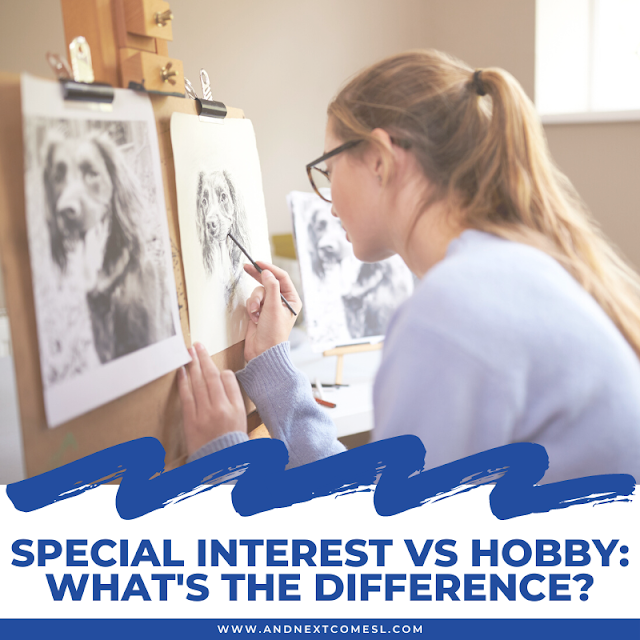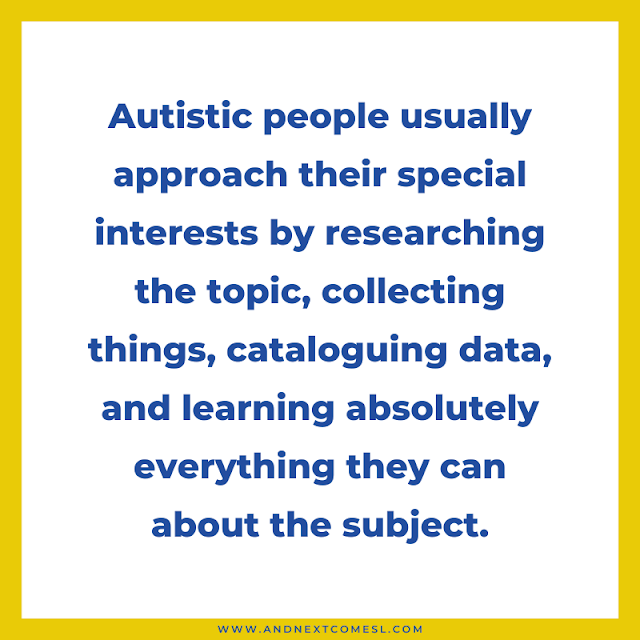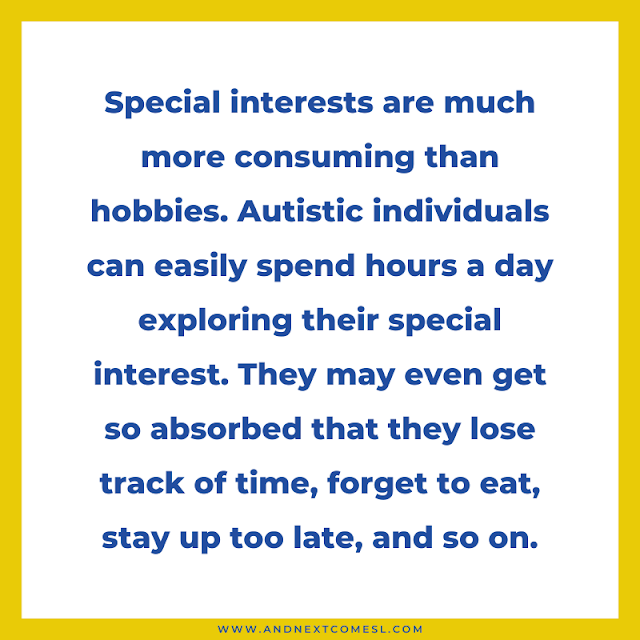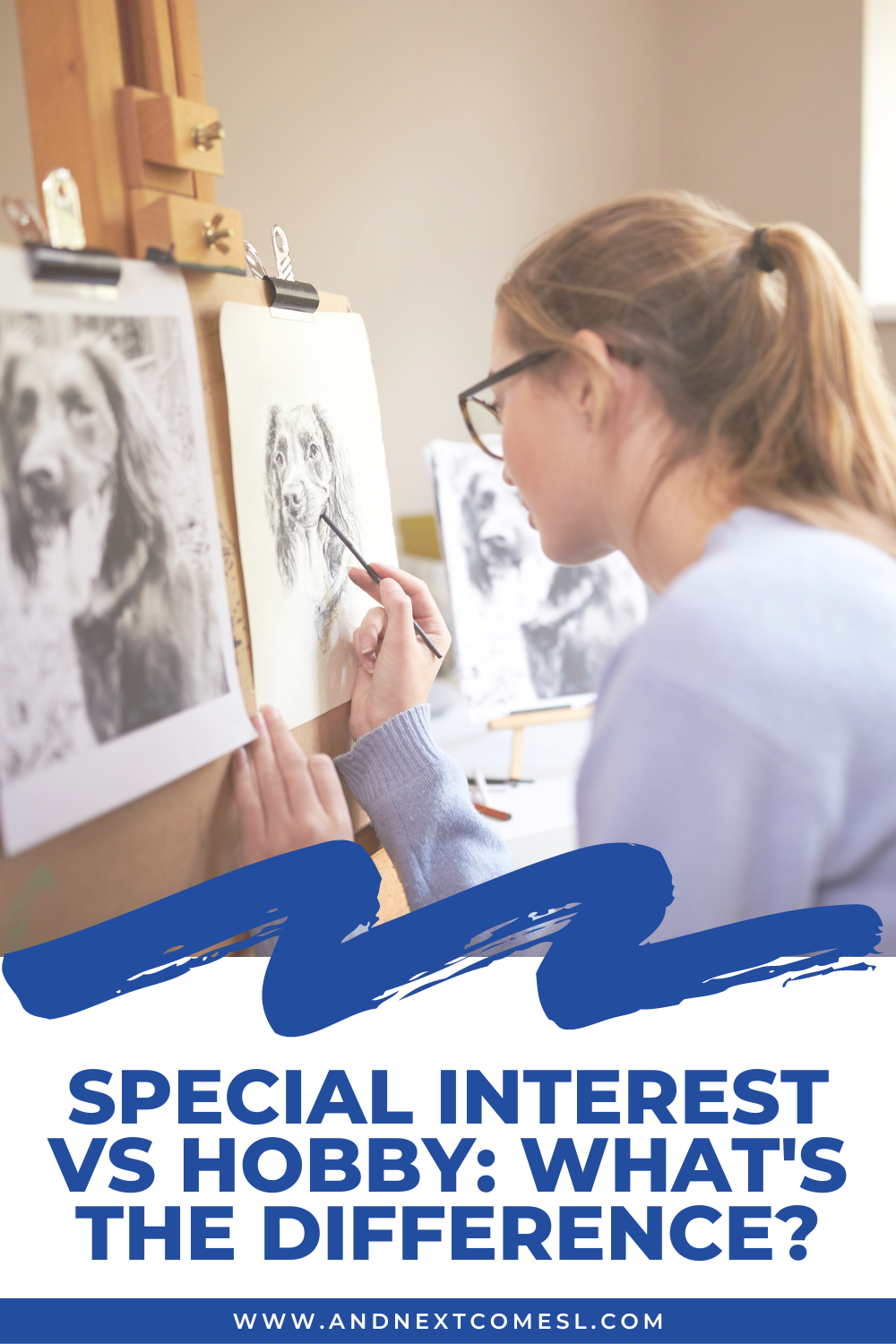Many people confuse the terms special interests and hobbies. They may mistake a hobby for a special interest or vice versa. I mean at first glance, the two may look or sound similar. However, they are quite different, as you will soon see.
Understanding the difference between hobbies and special interests is important because it will give you greater insight into autistic culture and the behaviors you might see. Knowing the difference will also help you better support your autistic child (or teen or adult!).
So let's take a closer look at a special interest vs a hobby and how they differ.
The Key Differences Between Hobbies and Special Interests
There are 5 main characteristics that differentiate special interests from hobbies:
- The intensity or degree to which it's present
- Their purpose
- How they are approached
- The amount of time that's devoted to it
- The topic or subject matter itself
Also, it is worth noting that special interests are much more common in autistic or neurodivergent populations than in neurotypical populations (see some stats on that here).
So while special interests are usually synonymous with autism, hobbies are much more universal. Everyone has a hobby of some sort. But it's important to look closer at the differences between the two than just who has what or does this or that.
The Intensity of a Special Interest vs a Hobby
You can think of a special interest as a really, really intense hobby. Like extremely intense. Sometimes special interests can become too much, like an obsession or an addiction, whereas hobbies are rarely obsessive or intense.
Usually, autistic individuals want to know everything they can about their special interest. So they end up going all in, becoming deeply invested in it and absorbed by it. We'll discuss this further in the how they're approached section.
Hobbies, in contrast, are rarely about getting to know every single thing about that topic. It's more about just participating in it or socializing versus learning everything you can.
Often, special interests are so consuming for autistic people that they may have little interest outside of that special interest. It may be all they do or talk about. It can sometimes kind of dominate everything they think or do. It can also sometimes interfere with daily life.
Although, please note that autistic people often have multiple special interests, not just one (see here). So they may be immersed in multiple intense interests at one time.
For autistic individuals, there is also an intense need for their special interests. So being deprived of their special interests can cause significant distress. That isn't the case for hobbies. They don't need hobbies like they need their special interests. By the way, you should familiarize yourself with the benefits of special interests because there are plenty of them.
The Purpose of Special Interests or Hobbies
One purpose of a special interest is to become an expert in something. That's why they want to know everything they can about their special interest and get so absorbed by it.
Special interests can also be used as a coping strategy or a distraction when overwhelmed or stressed. They often become a form of escapism. While hobbies are also used as a form of relaxation, they're not a main occupation like special interests usually are.
Hobbies are also enjoyed or engaged in differently than special interests. They are often about participating in something versus becoming an expert in the topic.
Hobbies are also something you might do when you're bored, whereas special interests aren't about relieving boredom.
Another purpose of hobbies is socialization. After all, hobbies are often shared by others. So it's not surprising that many people use hobbies as a way to connect with others, find friends, and socialize.
Special Interests & Hobbies are Approached Differently
As mentioned above, special interests are about becoming an expert. So autistic people usually approach special interests by researching the topic, collecting things, cataloguing data, and learning absolutely everything they can about the subject.
Hobbies, in contrast, are often more casual. It's all about actually doing the thing or participating in it versus researching it and knowing everything there is to know about it.
Oftentimes special interests end up being more of an individual or solo pursuit, whereas hobbies can often be shared with others.
Time Commitment for Special Interests vs Hobbies
Since hobbies are often more casual than special interests, you might only engage in a hobby once or twice a week or only when you're bored or want to socialize.
For special interests though, it's much more consuming. Autistic individuals can easily spend hours a day exploring their special interest. They may even get so absorbed that they lose track of time, forget to eat, stay up too late, and so on. There's a reason why special interests are often referred to as intense interests or obsessions.
How Special Interests & Hobbies Differ in Terms of Topic or Subject Matter
The topic or subject of one's hobbies usually stay fairly consistent over the years, whereas the topic of special interests may change. Although keep in mind that some special interests may be lifelong or even come and go (learn more here).
For special interests, the topic is often more narrow, specific, or circumscribed (e.g., the moons of Jupiter) while the topic of hobbies might be more broad like a certain sport or activity (e.g., sewing).
Some may view the topics of special interests as really unusual, strange, or weird compared to certain hobbies. They may even think that some special interests are childish or not age appropriate (e.g., an adult with a special interest in stuffed animals). Sadly, hobbies are usually seen as more socially acceptable than a lot of autistic special interests are, which is really unfair.
In other words, hobbies and special interests often differ in their perceived value and appropriateness, even though they both have value!
A Quick Recap of Special Interests and Hobbies
Special interests aren't the same thing as a hobby, as you learned above. They differ in their intensity, purpose, approach, time, and topic. Special interests are also much more common in autistic individuals, whereas hobbies are much more universal. So that's what you need to know about a special interest vs a hobby.










